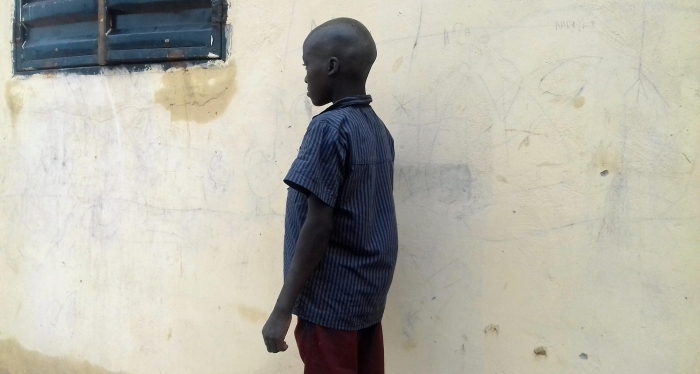Dauda* is 10 years old. He is from Bama, Borno State, northeast Nigeria. Today, he lives at a transit centre, the temporary home for hundreds of children and women, the survivors of the armed conflict in northeast Nigeria.
“I still remember the day when my village was attacked and I was separated from my parents,” recalls Dauda. “My father was selling firewood and my mother foodstuffs. Me and my brothers were attending qur’anic school.”
“We were ordered to follow the armed fighters and we knew that we would have been killed if we would have resisted,” he says describing a difficult journey into Sambisa forest, the camp for the non-state armed groups and the place where he was kept for more than two years.
“There was no food and we were only allowed to fetch water from a hole in the ground. Some days, the fighters brought grains from nearby farms and we got something to eat.”
“I was forced to call one of the men “father”, and to attend Qur’anic school. Many of the boys like me were sent to work on farms. We were asked to fetch water and asked to bring it to the leader’s house. If we ever refused to run any of the errands, we were beaten. We were treated like slaves.
Dauda was taken from Sambisa forest to Maimalari barracks in Maiduguri by one of the armed fighters, defecting the group. Dauda was kept in Maimalari for 26 days before being captured by the military and then being brought to Giwa Barracks. After three months in Giwa Barracks, he was released to the transit centre in early July 2018.
He dreams of being reunited with his father who is still being held in administrative custody at Giwa Barracks. “I want to help the sick and the less fortunate,” Dauda says talking about his aspirations about going to school and becoming a doctor.
“I want to thank UNICEF and the Ministry for their help and I pray for children, especially those without parents. They should be hopeful.”
UNICEF is working closely with both the Borno State Ministry of Women’s Affairs and Social Development and other partners to strengthen the resilience and community-based reintegration of 5,000 girls and boys formerly associated with armed forces or groups. This includes children like Dauda who have been released from administrative custody. The work is being co-funded by the Government of Japan through the Global Partnership to End Violence Against Children.
At the transit centre, Dauda and 182 other children released with him, are receiving psychosocial support, counselling and medical treatment. Social workers are helping the children to trace their parents or guardians, so that they can be reunited with their families.
*Dauda’s name has been changed to protect his identity.

